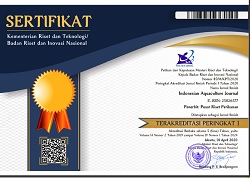NONSPECIFIC IMMUNE RESPONSE AND RESISTANCE OF Litopenaeus vannamei FED WITH NUCLEOTIDE, β-GLUCAN, AND PROTAGEN DIETS
Abstract
The objective of this research was to evaluate the nonspecific immune response and resistance of Litopenaeus vannamei fed with nucleotide, β–glucan, and protagen diets. Shrimp juveniles with an average weight of 5.39±0.56 g were reared in glass aquaria at a density of 15 shrimps/aquarium. Shrimps were fed three times a day for four weeks at a feeding rate of 3%/bw/day. Treatment diets consisted of A: basal diet (without immunostimulant), B: β–glucan, C: protagen, and D: nucleotide, each with three replicates. At the end of feeding period, the shrimps were intramuscularly injected with Vibrio harveyi 0.1 x 106 cfu.shrimp-1. Total haemocyte count (THC) of shrimp fed with nucleotide-diet was significantly different compared to that of control shrimp (p=0.01), but not different compared to shrimp fed with protagen-diet. PO activity also increased significantly in shrimp fed with nucleotide-diet (p=0.02). β–glucan diet could also increase THC and PO activity, but compared to the control, the increase was not significantly different. Overall, PO activity of shrimp fed with nucleotide, β–glucan, and protagen diets was high (>0.35). Oral administration of nucleotide, β–glucan, and protagen for four consecutive weeks significantly increased resistance of shrimp to disease (<0.01) where the highest resistance rate was observed on shrimp fed with nucleotide-diet. Growth of shrimp fed with nucleotide-diet was significantly different compared to that of control shrimp (p<0.01), as well as to β–glucan, and protagen-treated shrimp. As a conclusion, supplementation of nucleotide into shrimp pellet enhanced nonspecific immune response and growth performance better than β-glucan, and protagen.
Keywords
Full Text:
PDFDOI: http://dx.doi.org/10.15578/iaj.5.1.2010.37-44

Indonesian Aquaculture Journal is licensed under a Creative Commons Attribution-ShareAlike 4.0 International License.
















_25.jpg)


